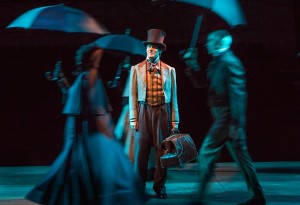 Toronto’s Soulpepper Presents a Slightly Modernized “Great Expectations”
Toronto’s Soulpepper Presents a Slightly Modernized “Great Expectations”
I’m embarrassed to admit that while I read Great Expectations in my grade eleven English class, I retained very little in terms of story. I was also curiously under a rock when the screen adaptation came out in the late nineties when I was romantic, impressionable and adolescent. As an adult, I was excited to see Soulpepper‘s adaptation of the Dickens classic last Thursday at the Young Centre for the Performing Arts.
For those like me who need a crash course, the story, in a nutshell, is as follows. A young orphan named Pip helps a convict, attracts the attention of the reclusive Miss Havisham and is invited to play with her adopted daughter, Estella. Pip falls in love and spends years improving himself. He finds himself the recipient of a mysterious benefactor’s generosity and moves to London to begin his education as a gentleman.
Forever on stage, Jeff Lillico carries the show as both the main character, Pip, and the narrator. Lillico bursts with emotion as he rides the tension of existing in two worlds, the world of the gentry and that of the labourer. Lillico’s lovelorn Pip elicits pity. As the character comes of age we feel his guilt and anguish as he seeks forgiveness for being a cad to the people who love him most.
Oliver Dennis is charming and engaging as Joe and as Mr. Wemmick. His Joe is so genuine, the kind of guy you’d want to buy a drink and listen to his homespun wisdom. It is absolutely heartbreaking to see Dennis’ Joe out of his element when speaking to people in the upper echelons.
Dennis’ Wemmick provides comic reprieve through his loving and adorable relationship with the Aged Parent.
Kate Trotter is terrifying as Miss Havisham, just as I’d hoped. The emotional journey of this character is compelling to watch. What starts out as a self-pitying sad sack transforms into an empathetic matron for Pip after recognizing the same pain she felt in Pip after Estella rejects him.
Leah Doz plays double duty as Estella and Biddy alternating accents between the common and the sophisticated. Unfortunately for Ms. Doz, Estella’s character is written flat, which doesn’t give the actor very many opportunities to display her range.
I suppose Dickens wrote Estella that way but I feel that an adaptation is able add depth to outdated, two-dimensional characterizations.
I wanted to see Estella rage against Miss Havisham’s upbringing, or to laugh more spitefully in the face of Pip’s earnest professions of love. She is cold but that doesn’t mean she is without depth. I would love to see a greater exploration of how Estella feels about being raised without feeling.
It is a traverse stage; the audience sits on either side facing the performers and each other. The open stage adds space and immediacy to the scenes being played. All four corners of the stage are used to full capacity to create various settings.
Rigid movements suggest the stuffiness of London society when Pip first moves there. Pip’s journey to London is marked by transition choreography that seems a bit out of place because it is so grandiose and not used at any other point in the production.
Shawn Kerwin’s set is austere. Seven grayish chairs are the only permanent set pieces and all others, two banquet tables and a cot, are rolled up and down the ramps at the sides of the stage for their scenes.
Steven Hawkins creates an eerie atmosphere in the graveyard and in Miss Havisham’s house with cool blue lighting. Warmer lighting is used to accentuate the homey feeling in Joe’s house and the pleasant atmosphere of the London apartment and Wemmick’s country home.
The book is as long and dense as I remember it, and playwright Michael Shamata takes a few liberties with the story. There are simply too many details to include in a two-hour performance.
It could have been due to my grumbling stomach or my heat-addled brain but the intrigue of the second act was lost on me. I found it difficult to distinguish detail and could not keep up with the quick pace of the show. I wonder if other audience members who are not familiar with the work were able to follow along better than I could.
Time, class, guilt and saying goodbye figure largely in the script. Personally, I feel this production relies too much on the reputation of the original work. It doesn’t take enough risks for my liking and, therefore, doesn’t impress as much as it could.
Details
- Great Expectations is playing at Young Centre for the Performing Arts (50 Tank House Lane) until August 17
- Performances are at 8pm with some Wednesday matinées. A full performance schedule is available onlne
- Tickets range from $32-$68
- Tickets can be purchased online or by calling the box office at 416-866-8666
Photo of Deborah Drakeford, Leah Doz, Jeff Lillico & Oliver Dennis by Cylla von Tiedemann
